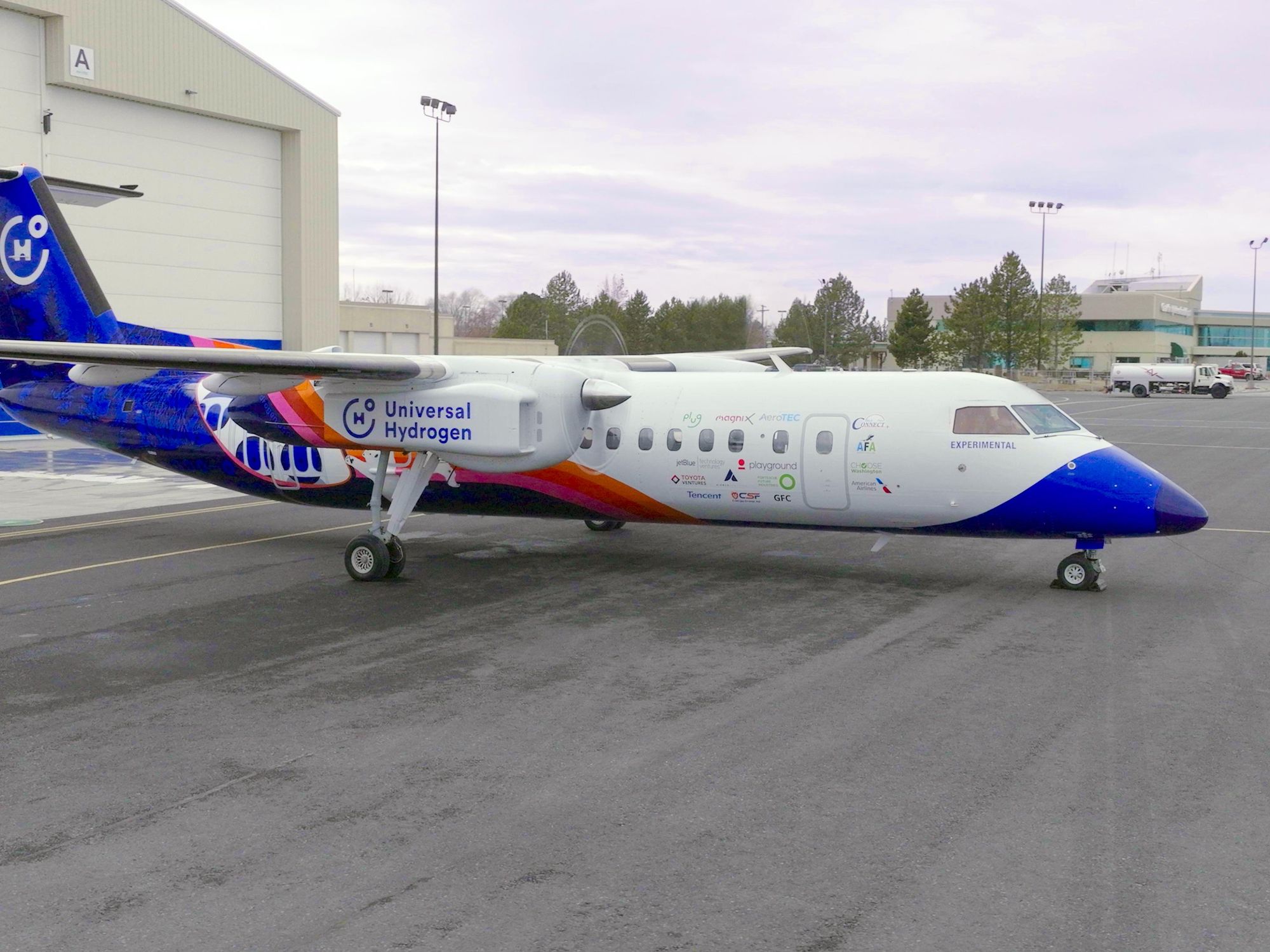Universal Hydrogen Wants To Be the Nespresso of Hydrogen-Powered Planes
David Shultz reports on clean technology and electric vehicles, among other industries, for dot.LA. His writing has appeared in The Atlantic, Outside, Nautilus and many other publications.

This week, Universal Hydrogen announced that it had received a “special airworthiness certificate in the experimental category by the Federal Aviation Administration.” As the name suggests, this certification allows the company to take its hydrogen-powered engines off the ground and into the skies for further testing.
The Hawthorne-based company has been developing a hydrogen fuel cell conversion kit for turbo prop planes since its inception in 2020, and in addition to the FAA certificate, the company also completed low speed taxi testing last week. These tests verify the plane's handling on the ground and function as a stress test for the engines at low power and airspeed.
With these milestones out of the way, Universal Hydrogen CEO Paul Eremenko says the company may complete its first test flight before the end of the month. “I think both on the technical side and on the regulatory side, this shows that we're ready,” says Eremenko.
Universal Hydrogen is now conducting high power endurance tests on their engines that simulate the mission profile of the first planned flight. Assuming these tests go accordingly, the upcoming test flight will take place in the company’s retrofitted Dash 8-300 aircraft and take off from Grant County International Airport in Moses Lake, Washington. The flight will be piloted by Air Force Test Pilot Alex Kroll. Kroll has served as the test pilot for over 40 different types of aircraft, including the brand new B-21 Raider, built by Northrop Grumman.
While a propeller plane destined for quick flights between regional airports may not carry the same kind of inherent excitement as a state-of-the-art stealth bomber, Universal Hydrogen’s fuel cell powertrain could make a real dent in aviation climate impacts. Globally, airlines produce roughly 2% of all CO2 emissions, which represents 12% of transportation sector CO2 emissions.
And since Aviation is likely the most complicated industry to transition to green energy sources, hydrogen power represents a potential path forward. Still, even if Universal Hydrogen’s test flight goes off without a hitch, there are many hurdles for the nascent technology to overcome.
Take Universal Hydrogen’s upcoming test flight for instance: This single, high-profile flight will not be powered by 100% green hydrogen because a small fraction of the electricity used to create the fuel may have been generated via fossil fuels. “You can’t trace every electron to a renewable source,” says Eremenko. “That is obviously not what we want for our go-to-market-plan. But the alternative for the first flight would’ve been to truck the hydrogen in from a fairly long distance to get true green hydrogen. The trucking, of course, would have created more of a CO2 footprint than then we would have saved.”
Eremenko’s admission exposes just how much work remains to be done before green hydrogen makes a positive climate impact in the aviation sector, but that’s the company’s real business model.
In other words, Universal Hydrogen doesn’t want to be in the business of building turboprop engines or retrofitting puddle jumpers, rather it wants to be a logistics and hydrogen supply company. Ultimately it’s building a modular hydrogen capsule that can be shipped on traditional freight railways and swapped in and out of planes as needed—almost like a massive battery, but filled with hydrogen gas instead of lithium. In addition, the company is manufacturing demand for their own product by retrofitting hydrogen fuel cell powertrains onto existing turbo prop planes.
“I like to analogize to Nespresso coffee,” says Eremenko. “We don't grow the coffee; we buy the coffee from other people; we put it in this convenient modular capsule format, and then we provide those as a service to the end user using existing freight infrastructure. But then you got to build the first coffeemaker, right? Otherwise, your modular capsules are not very useful. And so as Nespresso did, we're building the first coffee maker.”
If the test flight goes well, Universal Hydrogen could begin offering retrofitting kits as early as 2025 that allow airlines to convert their turboprop planes to hydrogen power.
David Shultz reports on clean technology and electric vehicles, among other industries, for dot.LA. His writing has appeared in The Atlantic, Outside, Nautilus and many other publications.




 Image Source: Skyryse
Image Source: Skyryse
 Image Source: Northwood Space
Image Source: Northwood Space